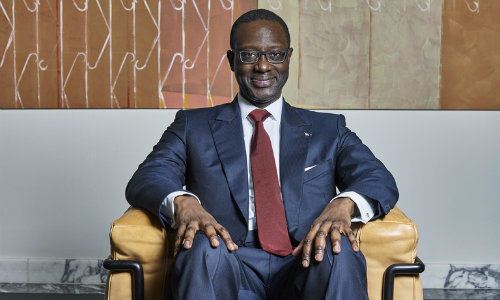3. Risk Bet Pays Off
Credit Suisse's Achilles heel in recent years has been a paper-thin capital cushion. Previous management under Brady Dougan overseen by chairman Urs Rohner (pictured below) for years seemed in denial over looming capital requirements, failing to resolve the issue. Now, Thiam has done so.

More than 10 billion francs in fresh capital have laid the groundwork. The newest capital-raising was risky: Credit Suisse had already tested investor patience with a quick cap hike in 2015, which promptly was spent to settle a costly U.S. mortgage security scandal.
Thiam has underwritten the bet by rigorously favoring businesses which earn their cost of capital. Investors took to the second cap hike in part because of its extremely shareholder-friendly terms – as one investment banker put it, they would have been stupid not to – but also because the fruits of Thiam's restructuring were becoming visible. The dilution resulting from the cap hike has, five months later, already been absorbed.
4. Revenue Boosters
One of Credit Suisse's core banking businesses is air and ship finance for private and institutional clients, which the Swiss bank has pursued for more than 70 years. The business, led by Martin Hofacker since the departure of long-standing head John Haefelfinger last year, has grown considerably since the financial crisis.
More risk translates to juicier returns, as well as potentially greater losses. For rival UBS, the air and ship finance business isn't worth the risk, as wealth management chief Juerg Zeltner recently told «Reuters».
5. Same DNA
While UBS has altered its identity dramatically following a state bailout in 2008, Credit Suisse's DNA is essentially the same as before its restructuring. To be sure, Credit Suisse hasn't abandoned Wall Street, especially where is spots potentially lucrative returns and has a good franchise, such as in leverage finance. The bank's history as a credit and trading house has also seeped into its private bank, which is far more willing to extend loans to wealthy clients than UBS is.

Credit Suisse's revenue mix has skewed more strongly towards private banking since Thiam's arrival, but Credit Suisse still draws 40 percent from investment banking – a split investors seem to favor.
6. Light at End of the Tunnel
It's not just employees and clients who are placing new trust in Credit Suisse. Investors are also on board, as the Swiss bank's price-to-book ration shows. One year ago, the bank struggled at 0.6x, and currently stands at 0.88x. That means Credit Suisse shares still trade at a 12 percent discount to book value.
Credit Suisse's valuation has improved, but is still ranks behind UBS, which trades at 1.2x book.
7. Smart Timing in Asia
Encouraging signs have come from Credit Suisse's business in Asia in recent months. While UBS has struggled to win new clients, in part due to a conservative business stance, Credit Suisse has willingly taken on more risk than its larger rival. For example, Credit Suisse is looser with granting loans to wealthy private clients.

Asian clients appreciate the generosity, especially as stock markets rose following a slump at the beginning of last year. Credit Suisse's targeted hiring in Asia also seems to be bearing fruit.
8. Under the Radar
Banking analysts are bypassing Credit Suisse at the moment in favor of more spectacular turnaround stories in European banking, or traditional private banks in Switzerland for value.
These are ideal circumstances for a firm which has been battered by weeks of unfavorable headlines – Credit Suisse can conclude its restructuring with little outside noise. As soon as further improvements from Thiam's restructuring are visible, investor interest will perk up – perhaps too late.
- << Back
- Page 2 of 2




































